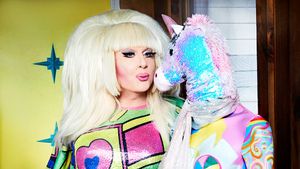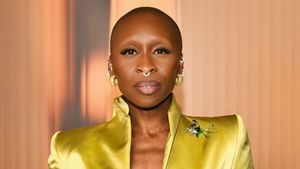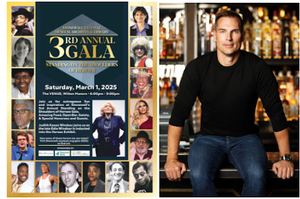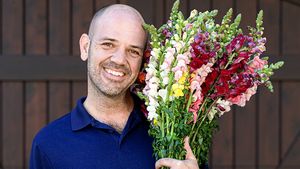One of the most consequential outcomes of the 2024 election has nothing to do with who won or lost; rather, families that were torn asunder because of their political beliefs. I know in my own family, I’ve had to keep at arm's length with some who have been enthusiastic about former President Donald Trump.
For me, I think what Trump did was put a magnifying glass on negative issues or personality traits that were ever-present in some family members. They were there all along, but for some reason, their support for Trump made them especially glaring.
His refusal to accept blame, to never apologize and his off-the-charts narcissism encapsulates one close family member. Now, it’s just so hard to see them in a different light, and sadly, I can’t picture a way forward.
There’s even dissension in the Trump family. I spoke to Trump’s niece Mary about that, and how she deals with the pain her uncle has inflicted on relatives.
Caroline Giuliani, the daughter of Rudy Giuliani, recently wrote an essay for Vanity Fair in which she describes the deep divisions within her family over her father Rudyi’s alliance with Donald Trump. She likens the separation to grieving the loss of her father, emphasizing that she both loves him and feels strongly that another Trump term could further erode their family and national unity.
In her essay, she writes that she is “trying to understand others in the context of the environments that shaped them,” finding that this approach allows empathy despite painful disagreements.
I had spoken to Giuliani before, and came away thinking, “Rudy did something right.”
If anyone knows the heartbreak that dissension in the family causes, it’s surely her; however, I didn’t want to speak to her about the past, but how she plans to move forward after the election, and how that might be a guide for all of us.
As the daughter of the former New York City mayor and Trump attorney, she has experienced firsthand the complexities of love and loyalty clashing with stark political disagreements. Drawing from personal growth, therapy, and familial experiences, Caroline discussed with me the importance of healing, not through perfect solutions, but through genuine human connection and empathy.
A simple and central theme of Caroline's approach is expressing love first — when it might be hard to find the right words to initiate dialogue. “If you don’t know what to say, saying, ‘I love you,’ is enough,” she suggested. “In strained moments, this simple expression can be a powerful step toward understanding and reconciliation.”
For many families, election cycles like 2024 have turned the personal into the political, creating divisions that might seem insurmountable. Caroline said that connection, especially in families, is not always about finding the right argument but about holding onto a shared sense of love and understanding.
“Try to understand people in the context of the environment and circumstances that shaped them,” she relayed. “While this may not dissolve differences, it can create space for empathy. This doesn’t mean condoning hurtful behavior or compromising one’s beliefs but rather recognizing that people’s views are shaped by unique histories and personal struggles.”
Her relationship with her father exemplifies these tensions. While she fundamentally disagrees with his political choices, she maintains a connection grounded in their shared history and mutual love. “I try to summon the ability to separate my father’s actions from my love for him, and this is something I have consciously worked on over the years.”
"In my early twenties, I realized that I didn’t have to withhold love to be true to my beliefs,” Caroline explained. “Being authentic to myself includes respecting my convictions while still showing compassion and care for my family.”
Caroline’s advice to other families facing similar rifts is to focus on the next generation, particularly young children, who serve as a unifying force. “Being an aunt has brought me a renewed sense of purpose with family relationships,” she said. “I think of the young people you want to stay connected with, and prioritizing those bonds which can help temper disagreements. It has motivated me to approach family gatherings with hope and resilience, seeing the children as opportunities for positivity.”
However, she acknowledges that healing is not always straightforward and cautions against accepting harmful behavior in the name of reconciliation. “It’s valid if people feel they need to cut ties for their well-being, because it’s necessary for self-care,” she remarked. “That’s why there is no one-size-fits-all solution to mending fences. I suppose families should seek a balance between maintaining boundaries and fostering connection.”
Understanding the “why” behind someone’s beliefs, she points out, can also make a difference. “You do this a lot in therapy too,” Caroline explained, “By delving into why people hold certain views, you can replace judgment with a more compassionate perspective, and that can alleviate personal hurt and open a path to mutual respect.”
I asked her when she might see her family again since the holidays are coming up. “We haven’t made any plans yet,” she thought. “I am sure there will be some get-together or connection somehow.”
At the end of our conversation, we were honest with each other that the promise of immediate harmony is probably not going to happen; however, at the very least, a framework can exist for fostering some type of connection.
Next year Caroline will get married, and she hopes to be surrounded by family. When I asked her if her dad would walk her down the aisle, she paused, then said, “While I think being given away at a wedding can be a beautiful tradition, I'm planning to walk myself down the aisle to honor the autonomy that we have as women.”
And with that, we said goodbye, and most importantly, good luck!



















































































